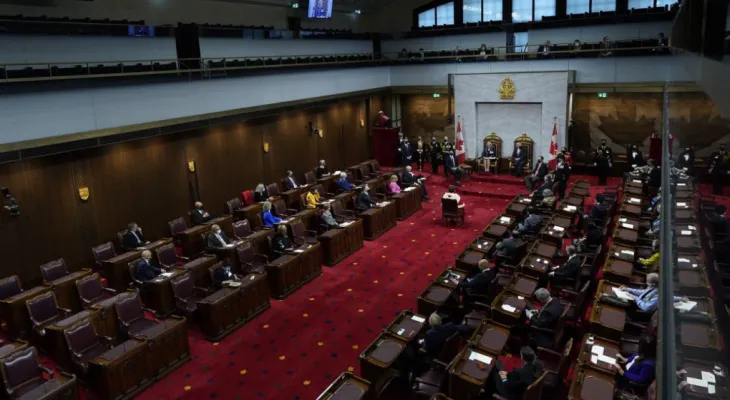Search here
Newspaper
Search here

Arab Canada News
News

Published: June 21, 2024
The Senate has approved a government bill aimed at helping to deter foreign interference, investigate it, and penalize it amid concerns that the legislation did not receive enough scrutiny and could unjustifiably violate fundamental freedoms.
Senators agreed to the legislation late Wednesday after voting down an amendment aimed at ensuring that innocents would not fall victim to it.
A recent report from the National Security and Intelligence Committee of Parliamentarians stated that foreign nations are engaging in sophisticated and widespread interference, specifically targeting democratic processes in Canada before, during, and after elections.
It found that China and India are the most active offenders, adding that these activities pose a significant threat to national security and the public safety of Canadian democracy.
The federal bill, known as C-70, establishes targeted foreign interference crimes due to deceptive or covert actions that undermine democratic processes. The government states that one example of this is secretly influencing the outcomes of political processes, such as nominating a candidate.
There is another new crime that criminalizes deceptive or covert acts that harm Canadian interests - for example, assisting foreign agents pretending to be tourists in entering Canada.
Additionally, the bill modifies provisions to better address foreign intimidation of individuals from diaspora communities in Canada.
The new sabotage crime focuses on behavior directed at critical infrastructure, such as systems that enable transportation or communications or support the delivery of health and food services.
The bill also allows the Canadian Security Intelligence Service to disclose sensitive information outside of government halls to build resilience against foreign interference.
The legislation acknowledges that foreign nations and other entities engaging in interference to achieve political goals may employ individuals to act on their behalf without disclosing those relationships.
The transparency registry will require certain individuals to register with the federal government to help protect against such activity.
Failure to register an arrangement or activity with a foreign entity - a force, state, entity, or economic entity - could lead to financial penalties or even criminal sanctions.
The criminal provisions of the bill, as well as the influence registry, target activities conducted "in collaboration with" a foreign entity - a phrasing that shocked Senator Yuen Pau Woo as being overly sweeping.
Woo proposed to delete this phrase from the bill to protect freedom of expression and association and help prevent stigmatizing Canadians who could be unfairly targeted with such vague terminology.
His proposed amendment was rejected on Wednesday, and senators proceeded to approve the legislation.
Woo faced accusations of excessive sympathy for the Chinese government, allegations he publicly denied.
He expressed "deep concern" on Thursday that the legislation could have a negative impact on civic engagement, especially among diaspora communities in Canada.
Saying, "I am concerned that Canadians who seek to contribute to Canadian democracy will be criminalized for their civil acts due to a bill that could categorize them as having done so secretly or deceitfully - based on being considered 'associated' with a foreign entity."
The legislation, which was introduced to the House of Commons earlier last month, swiftly passed through Parliament.
The International Civil Liberties Monitoring Group, based in Ottawa, stated on Thursday that a bill of such importance, complexity, and potential impact deserves more study.
The group, which speaks for dozens of civil society organizations, said it is disappointing but not surprising that no further changes were made to protect freedoms and charter rights.
They added, "As we shared during the fast-tracked study of the bill, addressing the harms caused by foreign interference is essential." "However, many of the proposals within Bill C-70 are too vague, lack safeguards and transparency, and go far beyond foreign interference."
Canadian Business Council Chair Goldy Hyder stated that parliamentarians have shown they can work collaboratively and effectively when it comes to national security.
Hyder noted that Canadian business leaders have long called for economic security measures in the bill, including new sabotage crimes and allowing for increased sharing of intelligence related to threats with Canadian businesses.
Dave Kuntz, co-founder of the Democracy Monitoring Group, stated that legislators "left gaps in the bill that allow for covert interference in elections, party leadership races, and government policymaking across Canada."
Comments